23届翻译大赛英译汉范文及中文译文
第23届韩素音青年翻译奖竞赛参考译文2
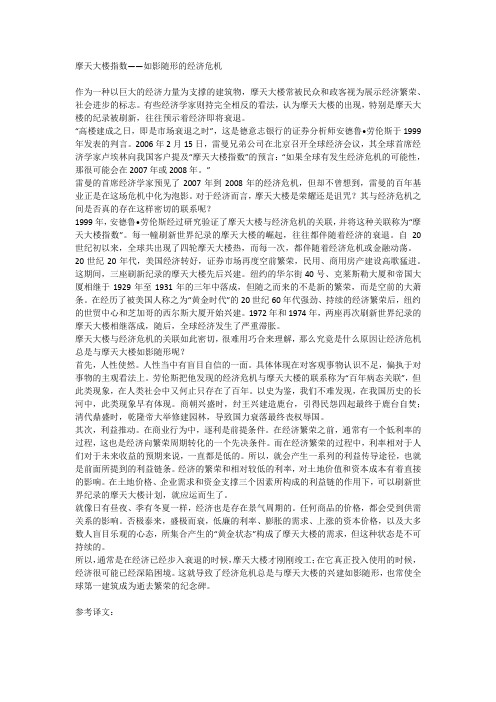
摩天大楼指数——如影随形的经济危机作为一种以巨大的经济力量为支撑的建筑物,摩天大楼常被民众和政客视为展示经济繁荣、社会进步的标志。
有些经济学家则持完全相反的看法,认为摩天大楼的出现,特别是摩天大楼的纪录被刷新,往往预示着经济即将衰退。
“高楼建成之日,即是市场衰退之时”,这是德意志银行的证券分析师安德鲁•劳伦斯于1999年发表的判言。
2006年2月15日,雷曼兄弟公司在北京召开全球经济会议,其全球首席经济学家卢埃林向我国客户提及“摩天大楼指数”的预言:“如果全球有发生经济危机的可能性,那很可能会在2007年或2008年。
”雷曼的首席经济学家预见了2007年到2008年的经济危机,但却不曾想到,雷曼的百年基业正是在这场危机中化为泡影。
对于经济而言,摩天大楼是荣耀还是诅咒?其与经济危机之间是否真的存在这样密切的联系呢?1999年,安德鲁•劳伦斯经过研究验证了摩天大楼与经济危机的关联,并将这种关联称为“摩天大楼指数”。
每一幢刷新世界纪录的摩天大楼的崛起,往往都伴随着经济的衰退。
自20世纪初以来,全球共出现了四轮摩天大楼热,而每一次,都伴随着经济危机或金融动荡。
20世纪20年代,美国经济转好,证券市场再度空前繁荣,民用、商用房产建设高歌猛进。
这期间,三座刷新纪录的摩天大楼先后兴建。
纽约的华尔街40号、克莱斯勒大厦和帝国大厦相继于1929年至1931年的三年中落成,但随之而来的不是新的繁荣,而是空前的大萧条。
在经历了被美国人称之为“黄金时代”的20世纪60年代强劲、持续的经济繁荣后,纽约的世贸中心和芝加哥的西尔斯大厦开始兴建。
1972年和1974年,两座再次刷新世界纪录的摩天大楼相继落成,随后,全球经济发生了严重滞胀。
摩天大楼与经济危机的关联如此密切,很难用巧合来理解,那么究竟是什么原因让经济危机总是与摩天大楼如影随形呢?首先,人性使然。
人性当中有盲目自信的一面。
具体体现在对客观事物认识不足,偏执于对事物的主观看法上。
2023catti杯翻译原文

2023catti杯翻译原文【原创实用版】目录1.2023catti 杯翻译原文概述2.2023catti 杯翻译原文的具体内容3.2023catti 杯翻译原文的难度与挑战4.2023catti 杯翻译原文的意义与价值5.总结正文【2023catti 杯翻译原文概述】2023catti 杯翻译原文,即 2023 年全国翻译专业资格(水平)考试CATTI 杯翻译大赛的原文,这是一场每年一度的翻译界盛事。
CATTI 杯翻译大赛旨在选拔优秀的翻译人才,促进我国翻译事业的发展。
本文将对2023catti 杯翻译原文进行概述,分析其具体内容、难度与挑战以及意义与价值。
【2023catti 杯翻译原文的具体内容】2023catti 杯翻译原文分为英汉和汉英两个方向,涵盖了政治、经济、文化、科技等多个领域。
原文内容既包括国内外重要政治文件、领导人讲话,也有国际组织、外国媒体的报道,以及涉及我国文化、历史、社会现象的文章。
这种多元化的内容设置,旨在检验参赛选手的翻译能力和综合素质。
【2023catti 杯翻译原文的难度与挑战】2023catti 杯翻译原文具有一定的难度和挑战。
首先,原文涉及的领域广泛,要求参赛选手具备扎实的双语基本功和广泛的知识储备。
其次,部分原文表述较为复杂,句式多样,对选手的翻译技巧提出了较高要求。
最后,大赛对选手的翻译速度也有一定要求,需要在规定时间内完成翻译任务。
【2023catti 杯翻译原文的意义与价值】2023catti 杯翻译原文对于参赛选手来说,具有重要的意义和价值。
首先,参加翻译大赛可以检验自己的翻译水平,为今后的翻译工作打下坚实基础。
其次,通过比赛,选手可以学习到其他优秀选手的翻译方法和技巧,提高自己的翻译能力。
最后,对于成绩优异的选手,还有机会获得丰厚的奖品和荣誉证书,为个人简历增色。
【总结】2023catti 杯翻译原文不仅为参赛选手提供了一个展示自己翻译水平的平台,也为我国翻译事业选拔了一批优秀的翻译人才。
第23届韩素音青年翻译奖竞赛译文4
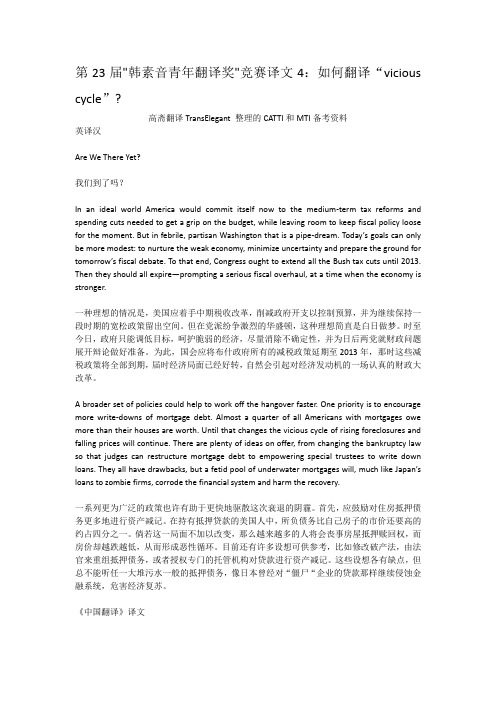
第23届"韩素音青年翻译奖"竞赛译文4:如何翻译“vicious cycle”?高斋翻译TransElegant整理的CATTI和MTI备考资料英译汉Are We There Yet?我们到了吗?In an ideal world America would commit itself now to the medium-term tax reforms and spending cuts needed to get a grip on the budget, while leaving room to keep fiscal policy loose for the moment. But in febrile, partisan Washington that is a pipe-dream. Today’s goals can only be more modest: to nurture the weak economy, minimize uncertainty and prepare the ground for tomorrow’s fiscal debate. To that end, Congress ought to extend all the Bush tax cuts until 2013. Then they should all expire—prompting a serious fiscal overhaul, at a time when the economy is stronger.一种理想的情况是,美国应着手中期税收改革,削减政府开支以控制预算,并为继续保持一段时期的宽松政策留出空间。
但在党派纷争激烈的华盛顿,这种理想简直是白日做梦。
时至今日,政府只能调低目标,呵护脆弱的经济,尽量消除不确定性,并为日后两党就财政问题展开辩论做好准备。
湖北省第二十三届外语翻译大赛笔译决赛试题答案 - 非英语专业A组
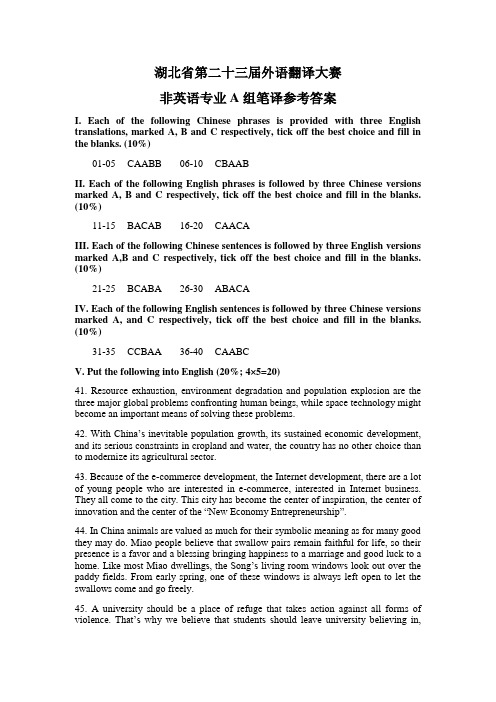
湖北省第二十三届外语翻译大赛非英语专业A组笔译参考答案I. Each of the following Chinese phrases is provided with three English translations, marked A, B and C respectively, tick off the best choice and fill in the blanks. (10%)01-05 CAABB 06-10 CBAABII. Each of the following English phrases is followed by three Chinese versions marked A, B and C respectively, tick off the best choice and fill in the blanks. (10%)11-15 BACAB 16-20 CAACAIII. Each of the following Chinese sentences is followed by three English versions marked A,B and C respectively, tick off the best choice and fill in the blanks. (10%)21-25 BCABA 26-30 ABACAIV. Each of the following English sentences is followed by three Chinese versions marked A, and C respectively, tick off the best choice and fill in the blanks. (10%)31-35 CCBAA 36-40 CAABCV. Put the following into English (20%; 4×5=20)41. Resource exhaustion, environment degradation and population explosion are the three major global problems confronting human beings, while space technology might become an important means of solving these problems.42. With China’s inevitable population growth, its sustained economic development, and its serious constraints in cropland and water, the country has no other choice than to modernize its agricultural sector.43. Because of the e-commerce development, the Internet development, there are a lot of young people who are interested in e-commerce, interested in Internet business. They all come to the city. This city has become the center of inspiration, the center of innovation and the center of the “New Economy Entrepreneurship”.44. In China animals are valued as much for their symbolic meaning as for many good they may do. Miao people believe that swallow pairs remain faithful for life, so their presence is a favor and a blessing bringing happiness to a marriage and good luck to a home. Like most Miao dwellings, the Song’s living room windows look out over the paddy fields. From early spring, one of these windows is always left open to let the swallows come and go freely.45. A university should be a place of refuge that takes action against all forms of violence. That’s why we believe that students should leave university believing in,striving for and expecting societies of true equality, society of true equality in every sense. And universities have the power to be vital catalyst for that change.VI. Put the following into Chinese (40%)46. 三个月后,他寄来了一个大邮包,里面有二十九封信和五十张照片,这些都是他在公海上利用闲暇逐渐积累起来的。
湖北省第23届翻译大赛 笔译决赛试题答案 - 非英语专业B组
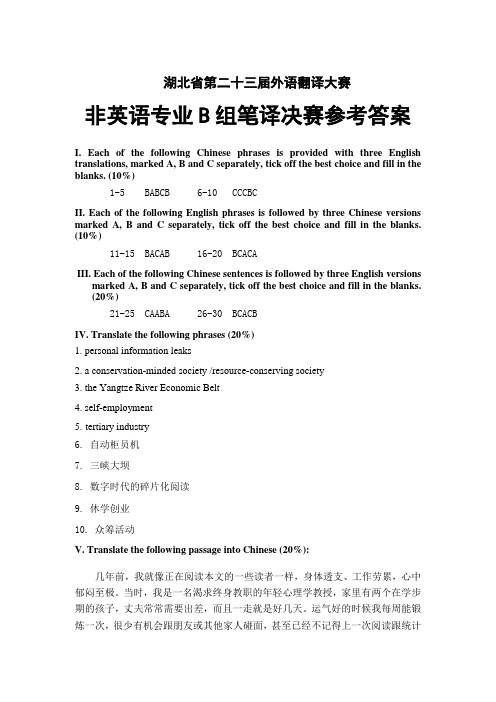
湖北省第二十三届外语翻译大赛非英语专业B组笔译决赛参考答案I. Each of the following Chinese phrases is provided with three English translations, marked A, B and C separately, tick off the best choice and fill in the blanks. (10%)1-5 BABCB 6-10 CCCBCII. Each of the following English phrases is followed by three Chinese versions marked A, B and C separately, tick off the best choice and fill in the blanks. (10%)11-15 BACAB 16-20 BCACAIII. Each of the following Chinese sentences is followed by three English versions marked A, B and C separately, tick off the best choice and fill in the blanks.(20%)21-25 CAABA 26-30 BCACBIV. Translate the following phrases (20%)1. personal information leaks2. a conservation-minded society /resource-conserving society3. the Yangtze River Economic Belt4. self-employment5.tertiary industry6. 自动柜员机7. 三峡大坝8. 数字时代的碎片化阅读9. 休学创业10. 众筹活动V. Translate the following passage into Chinese (20%):几年前,我就像正在阅读本文的一些读者一样,身体透支、工作劳累,心中郁闷至极。
2023catti杯翻译原文

2023catti杯翻译原文2023 CATTI杯翻译原文愿景和使命:2023 CATTI杯翻译大赛旨在促进翻译行业的发展和提高翻译人才素质。
通过组织这一国际性的翻译大赛,我们希望为各国翻译工作者提供一个交流、学习和展示的平台,激发他们的创作力和翻译技巧,推动翻译事业的繁荣。
大赛安排:本届翻译大赛将分为初赛、决赛和颁奖环节。
初赛将在2023年1月至3月期间进行,参赛者需按照要求完成指定的翻译任务,并提交作品。
经过初赛评审,优秀者将晋级决赛。
决赛将在2023年5月举行,参赛者将现场翻译一段指定的文本,由专业评委进行评审。
最后,将在决赛结束后进行颁奖典礼,表彰各个奖项的获得者。
参赛资格:本次大赛对参赛者的资格要求如下:1.具有中文或其他外语相关专业学历,并且具备一定的翻译实践经验;2.年龄不限,国籍不限;3.需承诺独立完成翻译任务,不得抄袭或借助机器翻译工具。
翻译任务:本次大赛的翻译任务主要包括文学、科技、经济、法律和时事等领域。
详细的翻译要求将在初赛开始前公布,并根据不同的语种设置相应的任务。
评委团队:本届大赛将邀请一流的翻译学者和专业人士组成评委团队,他们将负责对参赛者的作品进行评审和打分。
评委团队将严格按照统一的评分标准进行评判,确保公正、客观地选出最优秀的翻译作品。
奖项设置:本次大赛将设置一、二、三等奖以及优秀奖、人气奖等附加奖项。
每个奖项将评选出数量不等的获奖者,以表彰他们在翻译任务中的出色表现。
此外,大赛还将邀请优秀的获奖者参加一系列研讨会和培训活动,提高他们的专业能力。
宣传推广:为了让更多的翻译工作者了解和参与本届大赛,我们将通过各种渠道进行宣传推广,包括但不限于媒体报道、社交媒体推广、翻译机构合作等。
我们相信,通过广泛的宣传,能够吸引更多优秀的翻译从业者积极参与,使本次大赛更加具有影响力和参与度。
总结:2023 CATTI杯翻译大赛是一项重要的国际翻译赛事,旨在提高翻译人才素质,促进翻译事业的发展。
第23届韩素音青年翻译奖竞赛译文5
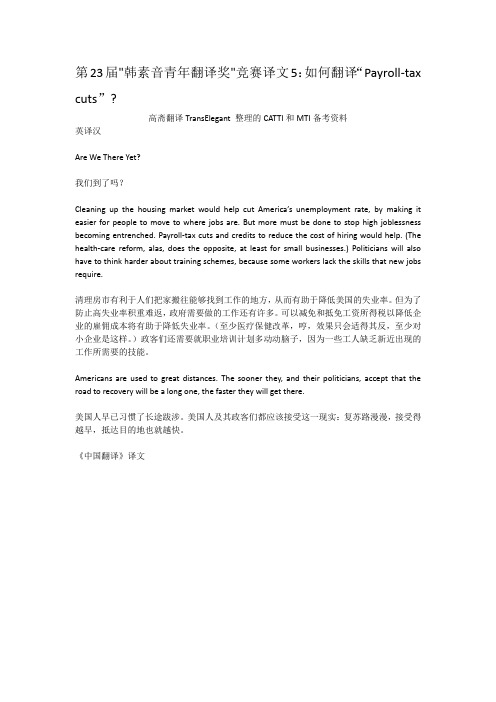
第23届"韩素音青年翻译奖"竞赛译文5:如何翻译“Payroll-tax cuts”?高斋翻译TransElegant整理的CATTI和MTI备考资料英译汉Are We There Yet?我们到了吗?Cleaning up the housing market would help cut America’s unemployment rate, by making it easier for people to move to where jobs are. But more must be done to stop high joblessness becoming entrenched. Payroll-tax cuts and credits to reduce the cost of hiring would help. (The health-care reform, alas, does the opposite, at least for small businesses.) Politicians will also have to think harder about training schemes, because some workers lack the skills that new jobs require.清理房市有利于人们把家搬往能够找到工作的地方,从而有助于降低美国的失业率。
但为了防止高失业率积重难返,政府需要做的工作还有许多。
可以减免和抵免工资所得税以降低企业的雇佣成本将有助于降低失业率。
(至少医疗保健改革,哼,效果只会适得其反,至少对小企业是这样。
)政客们还需要就职业培训计划多动动脑子,因为一些工人缺乏新近出现的工作所需要的技能。
Americans are used to great distances. The sooner they, and their politicians, accept that the road to recovery will be a long one, the faster they will get there.美国人早已习惯了长途跋涉。
第23届韩素音青年翻译奖竞赛汉译英原文
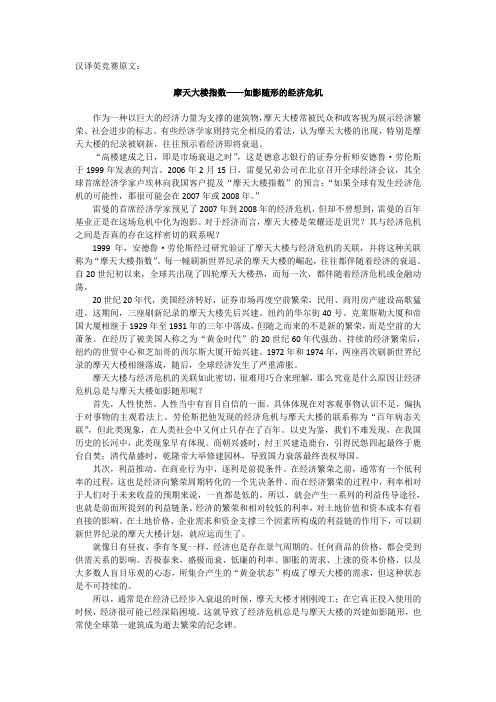
汉译英竞赛原文:摩天大楼指数——如影随形的经济危机作为一种以巨大的经济力量为支撑的建筑物,摩天大楼常被民众和政客视为展示经济繁荣、社会进步的标志。
有些经济学家则持完全相反的看法,认为摩天大楼的出现,特别是摩天大楼的纪录被刷新,往往预示着经济即将衰退。
“高楼建成之日,即是市场衰退之时”,这是德意志银行的证券分析师安德鲁·劳伦斯于1999年发表的判言。
2006年2月15日,雷曼兄弟公司在北京召开全球经济会议,其全球首席经济学家卢埃林向我国客户提及“摩天大楼指数”的预言:“如果全球有发生经济危机的可能性,那很可能会在2007年或2008年。
”雷曼的首席经济学家预见了2007年到2008年的经济危机,但却不曾想到,雷曼的百年基业正是在这场危机中化为泡影。
对于经济而言,摩天大楼是荣耀还是诅咒?其与经济危机之间是否真的存在这样密切的联系呢?1999年,安德鲁·劳伦斯经过研究验证了摩天大楼与经济危机的关联,并将这种关联称为“摩天大楼指数”。
每一幢刷新世界纪录的摩天大楼的崛起,往往都伴随着经济的衰退。
自20世纪初以来,全球共出现了四轮摩天大楼热,而每一次,都伴随着经济危机或金融动荡。
20世纪20年代,美国经济转好,证券市场再度空前繁荣,民用、商用房产建设高歌猛进。
这期间,三座刷新纪录的摩天大楼先后兴建。
纽约的华尔街40号、克莱斯勒大厦和帝国大厦相继于1929年至1931年的三年中落成,但随之而来的不是新的繁荣,而是空前的大萧条。
在经历了被美国人称之为“黄金时代”的20世纪60年代强劲、持续的经济繁荣后,纽约的世贸中心和芝加哥的西尔斯大厦开始兴建。
1972年和1974年,两座再次刷新世界纪录的摩天大楼相继落成,随后,全球经济发生了严重滞胀。
摩天大楼与经济危机的关联如此密切,很难用巧合来理解,那么究竟是什么原因让经济危机总是与摩天大楼如影随形呢?首先,人性使然。
人性当中有盲目自信的一面。
具体体现在对客观事物认识不足,偏执于对事物的主观看法上。
第三十二届韩素音国际翻译大赛英译汉原文
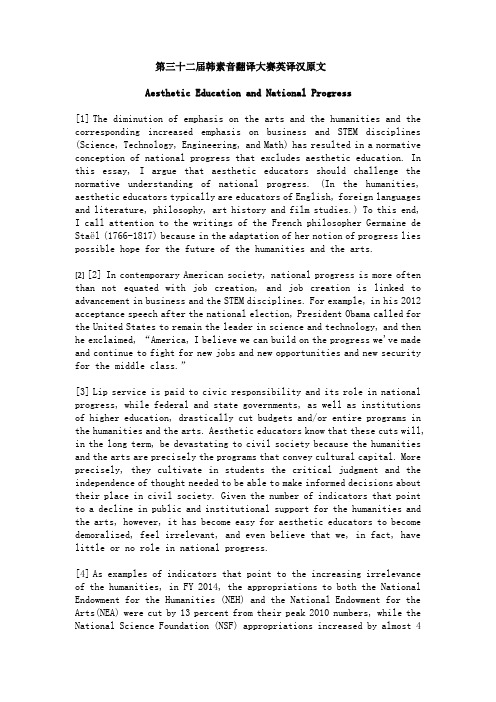
第三十二届韩素音翻译大赛英译汉原文Aesthetic Education and National Progress[1]The diminution of emphasis on the arts and the humanities and the corresponding increased emphasis on business and STEM disciplines (Science, Technology, Engineering, and Math) has resulted in a normative conception of national progress that excludes aesthetic education. In this essay, I argue that aesthetic educators should challenge the normative understanding of national progress. (In the humanities, aesthetic educators typically are educators of English, foreign languages and literature, philosophy, art history and film studies.) To this end, I call attention to the writings of the French philosopher Germaine de Staël (1766-1817) because in the adaptation of her notion of progress lies possible hope for the future of the humanities and the arts.[2][2] In contemporary American society, national progress is more often than not equated with job creation, and job creation is linked to advancement in business and the STEM disciplines. For example, in his 2012 acceptance speech after the national election, President Obama called for the United States to remain the leader in science and technology, and then he exclaimed, “America, I believe we can build on the progress we've made and continue to fight for new jobs and new opportunities and new security for the mi ddle class.”[3]Lip service is paid to civic responsibility and its role in national progress, while federal and state governments, as well as institutions of higher education, drastically cut budgets and/or entire programs in the humanities and the arts. Aesthetic educators know that these cuts will, in the long term, be devastating to civil society because the humanities and the arts are precisely the programs that convey cultural capital. More precisely, they cultivate in students the critical judgment and the independence of thought needed to be able to make informed decisions about their place in civil society. Given the number of indicators that point to a decline in public and institutional support for the humanities and the arts, however, it has become easy for aesthetic educators to become demoralized, feel irrelevant, and even believe that we, in fact, have little or no role in national progress.[4]As examples of indicators that point to the increasing irrelevance of the humanities, in FY 2014, the appropriations to both the National Endowment for the Humanities (NEH) and the National Endowment for the Arts(NEA) were cut by 13 percent from their peak 2010 numbers, while the National Science Foundation (NSF) appropriations increased by almost 4percent from 2010. Perhaps the 13 percent cut would not have been so shocking if the NEH and NEA allocations did not represent a mere 2 percent of the total NSF allocation. The pill is even harder to swallow when one considers that, in 1979, the NEH and the NEA, respectively, received funding equivalent to approximately 16 percent of the NSF.[5]Salaries represent a second measure of the diminishing consideration for the humanities and the arts within university structures. The Oklahoma Faculty Survey by Discipline, a study that surveys the salaries of professors at 114 “Research University/Very High Research Activity” institutions, lists average salaries for all ranks of tenure-track faculty in a number of disciplines. According to the 2013-14 study, the average salary of a faculty member in the arts was $71,463; in English, $76,627; in philosophy and religious studies, $81,971; in physical sciences, $102,636; in engineering, $114,827; and in business management, $139,093. While salaries in 2013-14 increased from 2011-12 in the physical science, engineering, and business management, they decreased in the fine arts, English, and philosophy. If markets drive salaries, the arts and the humanities are clearly not high in market demand. This lack of demand for the humanities and the arts is further underscored in Governor Rick Scott's proposal that tuition rates for Florida state universities be frozen for students who major in “strategic areas”. Lizette Alvarez from the New York Times states of Scott’s proposal, “The messa ge from Tallahassee could not be blunter: Give us engineers, scientists, health care specialists and technology experts. Do not worry so much about historians, philosophers, anthropologists and English majors.” From multiple perspectives, then, we see an explicit shift to STEM disciplines and a discouragement of humanities and arts education, whether in program development, faculty salaries, or student tuitions. Faced with what seems to be such overwhelming confirmation of aesthetic educators’ irrelevance t o today’s understanding of national progress—namely, advancement in business, science and technology—aesthetic educators in the humanities and the arts are struggling to communicate to others outside our field, and to the public at large, our vital role.[6]As demoralizing as the perceived irrelevance of arts and humanities education may be and as disappointing as our attempts to articulate our relevance have been, we may be able to begin to find hope and purpose in renewed debate around how we think about “progress” and, more precisely, the role of aesthetic education in “progress”. The writings of Germaine de Staël are particularly illuminating because they situate aesthetic education squarely in the progress of the nation and have bearing on the dilemma facing the humanities and the arts today. Her prescient philosophy turns the definition of progress on its head and could give aestheticeducators a powerful tool to fight for the increased relevance and vitality of the humanities and the arts in the broader notion of progress.[7]Germaine de Staël’s notion of progress—namely, the alignment of the perfectibility of the human mind (accretion of knowledge) with the perfectibility of the human species (interplay between individual morality and public morality) —has direct bearing on the difficulties that we as aesthetic educators are having today in articulating our essential role in national progress. Obviously, both types of progress (perfectibility of the human mind and perfectibility of the human species) are essential to the progress of the nation, but Germaine de Staël argues convincingly that they must align. Aesthetic educators might thus remind the public that business and the STEM disciplines neither have as their mandate the watchful alignment of individual and public morality (the vector that guarantees freedom and the continual perfecting of the nation) nor do they have as their directive resistance against dogma. Furthermore, investment in STEM at the expense of the arts and the humanities parallels th e Enlightenment’s obsession with progress as defined as the conservation and accretion of empirical knowledge and material gain. This obsession, at least in Germaine de Staël’s view, contributed to the neglect of the interior moral life of the individual. It, furthermore, diminished emphasis on moral responsibility and independence of judgment, which consequently led to increased partisanship, culminating in the fanaticism of the Reign of Terror. While it is hard to imagine the advent of a Reign of Terror in the United States, it can be argued that obsession with unbridled advancement in science and business at the expense of aesthetic education could lead to the weakening of individual morality—defined by Staël as the devotion to freedom, human rights, and the possibility of collective happiness for all.[8] If Germaine de Staël were alive today, she might argue that the solution to our current humanities and arts crisis is a relatively simple one. First, argue for national progress to be understood as the alignment of the perfectibility of the human mind with the perfectibility of the human species. Scientific advancement at the expense of the watchful alignment of individual and public morality poses a threat to the stability of our nation. Consequently, any call for national progress must include sufficient support of and funding for precisely the disciplines (the humanities and the arts) that have this alignment as their mandate. Secondly, encourage educational models that allow for the combination of a “useful” subject that contributes to a knowledge-based economy and a subject in which they will receive an aesthetic education.。
23届韩素音翻译大赛英译汉译文

路漫漫其修远兮美国经济复苏的进程会比以往任何经济萧条之后都慢很多,但政府或许能帮上一点小忙。
“尔欲何往,美利坚?”半个世纪前,“垮掉的一代”的代表杰克·凯鲁亚克提出的这个问题,是悬在世界经济头上的最大的不定性因素。
而且,它反映了美国选民们最大的担忧,他们要顶着全国失业率卡在一成,而且居高不下的严峻形势,去参加11月2号举行的国会中期选举。
他们要为打持久战、攻坚战做好准备。
1930年以来最棘手的经济萧条终于在一年前结束了。
但复苏的进程在起步阶段并不强劲,而且在今年年初突然变缓。
第二季度的GDP(国民生产总值)年增长速度只有可怜的1.6%,而且自那之后,就一直萎靡不振。
从短期的税收鼓励购房政策到期后,房产市场就一泻千里。
所以,我们在私营方面几乎没有创造什么工作岗位,失业率不降反升。
整个夏天充斥着恐慌,因为如果复苏的速度持续走低,美国经济又会重新陷入萧条的困境。
幸运的是,现在这种担忧似乎被夸大了。
第二季度GDP疲软的部分原因也许是从中国进口的暂时激增。
从八月可喜的零售业绩,到对失业补贴的需求持续减少,最新的数据都表明,尽管现在经济仍然很疲软,但不会再继续下跌了。
而历史证实,就算最初的经济复苏在一两个季度内会有摇摆,经济萧条却很少会故态复萌。
就现在来说,最有可能发生的是美国经济会在大约2.5个百分比的速度下缓慢增长:虽然比没有速度强,但也慢得难以给失业率带来什么明显的改善。
为什么通常美国经济都会在萧条后反弹,但这次的前景却一片黯淡呢?这是因为过去大多数的经济萧条都是紧缩的货币政策造成的,政策放宽了,需求也就反弹了。
但这次经济萧条是金融危机造成的。
而通常发生金融危机之后,从萧条中的复苏都是疲软和缓慢的,原因是银行系统需要修复,资产负债表需要重建。
一般来说,债务减持的过程要持续七年左右,这意味着美国要在2014年才能从中抽身。
一些家庭通过一些手段以非同寻常的速度减少债务负担,但就算是最乐观的估计,漫漫长征路也才刚刚走过一半。
翻译竞赛英译汉参赛原文 (1)
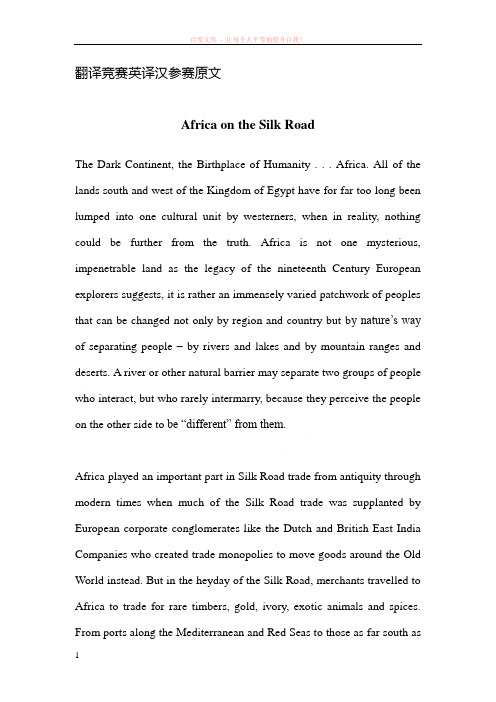
翻译竞赛英译汉参赛原文Africa on the Silk RoadThe Dark Continent, the Birthplace of Humanity . . . Africa. All of the lands south and west of the Kingdom of Egypt have for far too long been lumped into one cultural unit by westerners, when in reality, nothing could be further from the truth. Africa is not one mysterious, impenetrable land as the legacy of the nineteenth Century European explorers suggests, it is rather an immensely varied patchwork of peoples that can be changed not only by region and country but b y nature’s way of separating people – by rivers and lakes and by mountain ranges and deserts. A river or other natural barrier may separate two groups of people who interact, but who rarely intermarry, because they perceive the people on the other side to be “different” from them.Africa played an important part in Silk Road trade from antiquity through modern times when much of the Silk Road trade was supplanted by European corporate conglomerates like the Dutch and British East India Companies who created trade monopolies to move goods around the Old World instead. But in the heyday of the Silk Road, merchants travelled to Africa to trade for rare timbers, gold, ivory, exotic animals and spices. From ports along the Mediterranean and Red Seas to those as far south asMogadishu and Kenya in the Indian Ocean, goods from all across the continent were gathered for the purposes of trade.One of Africa’s contributions to world cuisine that is still widely used today is sesame seeds. Imagine East Asian food cooked in something other than its rich sesame oil, how about the quintessential American-loved Chinese dish, General Tso’s Chicken? How ‘bout the rich, thick tahini paste enjoyed from the Levant and Middle East through South and Central Asia and the Himalayas as a flavoring for foods (hummus, halva) and stir-fries, and all of the breads topped with sesame or poppy seeds? Then think about the use of black sesame seeds from South Asian through East Asian foods and desserts. None of these cuisines would have used sesame in these ways, if it hadn’t been for the trade of sesame seeds from Africa in antiquity.Given the propensity of sesame plants to easily reseed themselves, the early African and Arab traders probably acquired seeds from native peoples who gathered wild seeds. The seeds reached Egypt, the Middle East and China by 4,000 –5,000 years ago as evidenced from archaeological investigations, tomb paintings and scrolls. Given the eager adoption of the seeds by other cultures and the small supply, the cost per pound was probably quite high and merchants likely made fortunes offthe trade.Tamarind PodsThe earliest cultivation of sesame comes from India in the Harappan period of the Indus Valley by about 3500 years ago and from then on, India began to supplant Africa as a source of the seeds in global trade. By the time of the Romans, who used the seeds along with cumin to flavor bread, the Indian and Persian Empires were the main sources of the seeds.Another ingredient still used widely today that originates in Africa is tamarind. Growing as seed pods on huge lace-leaf trees, the seeds are soaked and turned into tamarind pulp or water and used to flavor curries and chutneys in Southern and South Eastern Asia, as well as the more familiar Worcestershire and barbeque sauces in the West. Eastern Africans use Tamarind in their curries and sauces and also make a soup out of the fruits that is popular in Zimbabwe. Tamarind has been widely adopted in the New World as well as is usually blended with sugar for a sweet and sour treat wrapped in corn husk as a pulpy treat or also used as syrup to flavor sodas, sparkling waters and even ice cream.Some spices of African origin that were traded along the Silk Road have become extinct. One such example can be found in wild silphion whichwas gathered in Northern Africa and traded along the Silk Road to create one of the foundations of the wealth of Carthage and Kyrene. Cooks valued the plant because of the resin they gathered from its roots and stalk that when dried became a powder that blended the flavors of onion and garlic. It was impossible for these ancient people to cultivate, however, and a combination of overharvesting, wars and habitat loss cause the plant to become extinct by the end of the first or second centuries of the Common Era. As supplies of the resin grew harder and harder to get, it was supplanted by asafetida from Central Asia.Other spices traded along the Silk Road are used almost exclusively in African cuisines today – although their use was common until the middle of the first millennium in Europe and Asia. African pepper, Moor pepper or negro pepper is one such spice. Called kieng in the cuisines of Western Africa where it is still widely used, it has a sharp flavor that is bitter and flavorful at the same time –sort of like a combination of black pepper and nutmeg. It also adds a bit of heat to dishes for a pungent taste. Its use extends across central Africa and it is also found in Ethiopian cuisines. When smoked, as it often is in West Africa before use, this flavor deepens and becomes smoky and develops a black cardamom-like flavor. By the middle of the 16th Century, the use and trade of negro pepper in Europe, Western and Southern Asia had waned in favor of black pepper importsfrom India and chili peppers from the New World.Traditional Chinese ShipGrains of paradise, Melegueta pepper, or alligator pepper is another Silk Road Spice that has vanished from modern Asian and European food but is still used in Western and Northern Africa and is an important cash crop in some areas of Ethiopia. Native to Africa’s West Coast its use seems to have originated in or around modern Ghana and was shipped to Silk Road trade in Eastern Africa or to Mediterranean ports. Fashionable in the cuisines of early Renaissance Europe its use slowly waned until the 18th Century when it all but vanished from European markets and was supplanted by cardamom and other spices flowing out of Asia to the rest of the world.The trade of spices from Africa to the rest of the world was generally accomplished by a complex network of merchants working the ports and cities of the Silk Road. Each man had a defined, relatively bounded territory that he traded in to allow for lots of traders to make a good living moving goods and ideas around the world along local or regional. But occasionally, great explorers accomplished the movement of goods across several continents and cultures.Although not African, the Chinese Muslim explorer Zheng He deserves special mention as one of these great cultural diplomats and entrepreneurs. In the early 15th Century he led seven major sea-faring expeditions from China across Indonesia and several Indian Ocean ports to Africa. Surely, Chinese ships made regular visits to Silk Road ports from about the 12th Century on, but when Zheng came, he came leading huge armadas of ships that the world had never seen before and wouldn’t see again for several centuries. Zheng came in force, intending to display China’s greatness to the world and bring the best goods from the rest of the world back to China. Zheng came eventually to Africa where he left laden with spices for cooking and medicine, wood and ivory and hordes of animals. It may be hard for us who are now accustomed to the world coming on command to their desktops to imagine what a miracle it must have been for the citizens of Nanjing to see the parade of animals from Zheng’s cultural Ark. But try we must to imagine the wonder brought by the parade of giraffes, zebra and ostriches marching down Chinese streets so long ago –because then we can begin to imagine the importance of the Silk Road in shaping the world.。
23届翻译大赛英译汉范文及中文译文

英译汉原文:Are We There Yet?America’s recovery will be much slower than that from most recessions; but the government can help a bit.“WHITHER goest thou, America?” That question, posed by Jack Kerouac on behalf of the Beat generation half a century ago, is the biggest uncertainty hanging over the world economy. And it reflects the foremost worry for American voters, who go to the polls for the congressional mid-term elections on November 2nd with the country’s unemployment rate stubbornly stuck at nearly one in ten. They should prepare themselves for a long, hard ride. The most wrenching recession since the 1930s ended a year ago. But the recovery—none too powerful to begin with—slowed sharply earlier this year. GDP grew by a feeble 1.6% at an annual pace in the second quarter, and seems to have been stuck somewhere similar since. The housing market slumped after temporary tax incentives to buy a home expired. So few private jobs were being created that unemployment looked more likely to rise than fall. Fears grew over the summer that if this deceleration continued, America’s economy would slip back into recession. Fortunately, those worries now seem exaggerated. Part of the weakness of second-quarter GDP was probably because of a temporary surge in imports from China. The latest statistics, from reasonably good retail sales in August to falling claims for unemployment benefits, point to an economy that, though still weak, is not slumping further. And history suggests that although nascent recoveries often wobble for a quarter or two, they rarely relapse into recession. For now, it is most likely that America’s economy will crawl along with growth at perhaps 2.5%: above stall speed, but far too slow to make much difference to the jobless rate. Why, given that Am erica usually rebounds from recession, are the prospects so bleak? That’s because most past recessions have been caused by tight monetary policy. When policy is loosened, demand rebounds. This recession was the result of a financial crisis. Recoveries after financial crises are normally weak and slow as banking systems are repaired and balance-sheets rebuilt. Typically, this period of debt reduction lasts around seven years, which means America would emerge from it in 2014. By some measures, households are reducing their debt burdens unusually fast, but even optimistic seers do not think the process is much more than half over.Battling on the busAmerica’s biggest problem is that its politicians have yet to acknowledge that the economy is in for such a long, slow haul, let alone prepare for the consequences. A few brave officials are beginning to sound warnings that the jobless rate is likely to “stay high”. But the political debate is more about assigning blame for the recession than about suggesting imaginative ways to give more oomph to the recovery. Republicans argue that Barack Obama’s shift towards “big government” explains the economy’s weakness, and that high unemployment is proof that fiscal stimulus was a bad idea. In fact, most of the growth in government to date has been temporary and unavoidable; the longer-run growth in government is more modest, and reflects the policies of both Mr Obama and his predecessor. And the notion that high joblessness “proves” that stimulus failed is simply wrong. Th e mechanicsof a financial bust suggest that without a fiscal boost the recession would have been much worse. Democrats have their own class-warfare version of the blame game, in which Wall Street’s excesses caused the problem and higher taxes on high-earners are part of the solution. That is why Mr. Obama’s legislative priority before the mid-terms is to ensure that the Bush tax cuts expire at the end of this year for households earning more than $250,000 but are extended for everyone else. This takes an unnecessary risk with the short-term recovery. America’s experience in 1937 and Japan’s in 1997 are powerful evidence that ill-timed tax rises can tip weak economies back into recession. Higher taxes at the top, along with the waning of fiscal stimulus and belt-tightening by the states, will make a weak growth rate weaker still. Less noticed is that Mr. Obama’s fiscal plan will also worsen the medium-term budget mess, by making tax cuts for the middle class permanent.Ways to overhaul the engineIn an ideal world America would commit itself now to the medium-term tax reforms and spending cuts needed to get a grip on the budget, while leaving room to keep fiscal policy loose for the moment. But in febrile, partisan Washington that is a pipe-dream. Today’s g oals can only be more modest: to nurture the weak economy, minimize uncertainty and prepare the ground for tomorrow’s fiscal debate. To that end, Congress ought to extend all the Bush tax cuts until 2013. Then they should all expire—prompting a serious fiscal overhaul, at a time when the economy is stronger.A broader set of policies could help to work off the hangover faster. One priority is to encourage more write-downs of mortgage debt. Almost a quarter of all Americans with mortgages owe more than their houses are worth. Until that changes the vicious cycle of rising foreclosures and falling prices will continue. There are plenty of ideas on offer, from changing the bankruptcy law so that judges can restructure mortgage debt to empowering special trustees to write down loans. They all have drawbacks, but a fetid pool of underwater mortgages will, much like Japan’s loans to zombie firms, corrode the financial system and harm the recovery. Cleaning up the housing market would help cut America’s unemployment rate, by making it easier for people to move to where jobs are. But more must be done to stop high joblessness becoming entrenched. Payroll-tax cuts and credits to reduce the cost of hiring would help. (The health-care reform, alas, does the opposite, at least for small businesses.) Politicians will also have to think harder about training schemes, because some workers lack the skills that new jobs require. Americans are used to great distances. The sooner they, and their politicians, accept that the road to recovery will be a long one, the faster they will get there.译文:我们到达目的地了吗?与大多数衰退之后的复苏相比,这次美国经济的复苏会慢得多。
英译汉-翻译参考译文
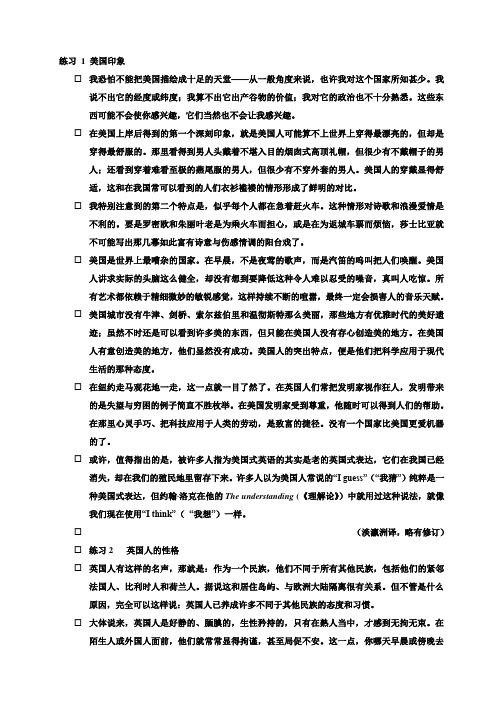
练习1 美国印象☐我恐怕不能把美国描绘成十足的天堂——从一般角度来说,也许我对这个国家所知甚少。
我说不出它的经度或纬度;我算不出它出产谷物的价值;我对它的政治也不十分熟悉。
这些东西可能不会使你感兴趣,它们当然也不会让我感兴趣。
☐在美国上岸后得到的第一个深刻印象,就是美国人可能算不上世界上穿得最漂亮的,但却是穿得最舒服的。
那里看得到男人头戴着不堪入目的烟囱式高顶礼帽,但很少有不戴帽子的男人;还看到穿着难看至极的燕尾服的男人,但很少有不穿外套的男人。
美国人的穿戴显得舒适,这和在我国常可以看到的人们衣衫褴褛的情形形成了鲜明的对比。
☐我特别注意到的第二个特点是,似乎每个人都在急着赶火车。
这种情形对诗歌和浪漫爱情是不利的。
要是罗密欧和朱丽叶老是为乘火车而担心,或是在为返城车票而烦恼,莎士比亚就不可能写出那几幕如此富有诗意与伤感情调的阳台戏了。
☐美国是世界上最嘈杂的国家。
在早晨,不是夜莺的歌声,而是汽笛的呜叫把人们唤醒。
美国人讲求实际的头脑这么健全,却没有想到要降低这种令人难以忍受的噪音,真叫人吃惊。
所有艺术都依赖于精细微妙的敏锐感觉,这样持续不断的喧嚣,最终一定会损害人的音乐天赋。
☐美国城市没有牛津、剑桥、索尔兹伯里和温彻斯特那么美丽,那些地方有优雅时代的美好遗迹;虽然不时还是可以看到许多美的东西,但只能在美国人没有存心创造美的地方。
在美国人有意创造美的地方,他们显然没有成功。
美国人的突出特点,便是他们把科学应用于现代生活的那种态度。
☐在纽约走马观花地一走,这一点就一目了然了。
在英国人们常把发明家视作狂人,发明带来的是失望与穷困的例子简直不胜枚举。
在美国发明家受到尊重,他随时可以得到人们的帮助。
在那里心灵手巧、把科技应用于人类的劳动,是致富的捷径。
没有一个国家比美国更爱机器的了。
☐或许,值得指出的是,被许多人指为美国式英语的其实是老的英国式表达,它们在我国已经消失,却在我们的殖民地里留存下来。
许多人以为美国人常说的“I guess”(“我猜”)纯粹是一种美国式表达,但约翰∙洛克在他的The understanding (《理解论》)中就用过这种说法,就像我们现在使用“I think”(“我想”)一样。
第23届韩素音青年翻译奖竞赛参考译文

英译汉原文:Are We There Yet?America’s recovery will be much slower than that from most recessions; but the government can help a bit.“WHITHER goest thou, America?” That question, posed by Jack Kerouac on behalf of the Beat generation half a century ago, is the biggest uncertainty hanging over the world economy. And it reflects the foremost worry for American voters, who go to the polls for the congressional mid-term elections on November 2nd with the country’s unemployment rate stubbornly stuck at nearly one in ten. They should prepare themselves for a long, hard ride.The most wrenching recession since the 1930s ended a year ago. But the recovery—none too powerful to begin with—slowed sharply earlier this year. GDP grew by a feeble 1.6% at an annual pace in the second quarter, and seems to have been stuck somewhere similar since. The housing market slumped after temporary tax incentives to buy a home expired. So few private jobs were being created that unemployment looked more likely to rise than fall. Fears grew over the summer that if this deceleration continued, America’s economy would slip back into recession.Fortunately, those worries now seem exaggerated. Part of the weakness of second-quarter GDP was probably because of a temporary surge in imports from China. The latest statistics, from reasonably good retail sales in August to falling claims for unemployment benefits, point to an economy that, though still weak, is not slumping further. And history suggests that although nascent recoveries often wobble for a quarter or two, they rarely relapse into recession. For now, it is most likely that America’s economy will crawl along with growth at perhaps 2.5%: above stall speed, but far too slow to make much difference to the jobless rate.Why, given that America usually rebounds from recession, are the prospects so bleak? That’s because most past recessions have been caused by tight monetary policy. When policy is loosened, demand rebounds. This recession was the result of a financial crisis. Recoveries after financial crises are normally weak and slow as banking systems are repaired and balance-sheets rebuilt. Typically, this period of debt reduction lasts around seven years, which means America would emerge from it in 2014. By some measures, households are reducing their debt burdens unusually fast, but even optimistic seers do not think the process is much more than half over.Battling on the busAmerica’s biggest problem is that its poli ticians have yet to acknowledge that the economy is in for such a long, slow haul, let alone prepare for the consequences.A few brave officials are beginning to sound warnings that the jobless rate is likely to “stay high”. But the political debate is mor e about assigning blame for the recession than about suggesting imaginative ways to give more oomph to the recovery. Republicans argue that Barack Obama’s shift towards “big government” explainsthe economy’s weakness, and that high unemployment is proof t hat fiscal stimulus was a bad idea. In fact, most of the growth in government to date has been temporary and unavoidable; the longer-run growth in government is more modest, and reflects the policies of both Mr Obama and his predecessor. And the notion that high joblessness “proves” that stimulus failed is simply wrong. The mechanics of a financial bust suggest that without a fiscal boost the recession would have been much worse.Democrats have their own class-warfare version of the blame game, in which Wall Street’s excesses caused the problem and higher taxes on high-earners are part of the solution. That is why Mr. Obama’s legislative priority before the mid-terms is to ensure that the Bush tax cuts expire at the end of this year for households earning more than $250,000 but are extended for everyone else.This takes an unnecessary risk with the short-term recovery. America’s experience in 1937 and Japan’s in 1997 are powerful evidence that ill-timed tax rises can tip weak economies back into recession. Higher taxes at the top, along with the waning of fiscal stimulus and belt-tightening by the states, will make a weak growth rate weaker still. Less noticed is that Mr. Obama’s fiscal plan will also worsen the medium-term budget mess, by making tax cuts for the middle class permanent.Ways to overhaul the engineIn an ideal world America would commit itself now to the medium-term tax reforms and spending cuts needed to get a grip on the budget, while leaving room to keep fiscal policy loose for the moment. But in febrile, partisan Washington that is a pipe-dream. Today’s goals can only be more modest: to nurture the weak economy, minimize uncertainty and prepare the ground for tomorrow’s fiscal debate. To that end, Congress ought to extend all the Bush tax cuts until 2013. Then they should all expire—prompting a serious fiscal overhaul, at a time when the economy is stronger.A broader set of policies could help to work off the hangover faster. One priority is to encourage more write-downs of mortgage debt. Almost a quarter of all Americans with mortgages owe more than their houses are worth. Until that changes the vicious cycle of rising foreclosures and falling prices will continue. There are plenty of ideas on offer, from changing the bankruptcy law so that judges can restructure mortgage debt to empowering special trustees to write down loans. They all have drawbacks, but a fetid pool of underwater mortgages will, much like Japan’s loans to zombie firms, corrode the financial system and harm the recovery.C leaning up the housing market would help cut America’s unemployment rate, by making it easier for people to move to where jobs are. But more must be done to stop high joblessness becoming entrenched. Payroll-tax cuts and credits to reduce the cost of hiring would help. (The health-care reform, alas, does the opposite, at least for small businesses.) Politicians will also have to think harder about training schemes, because some workers lack the skills that new jobs require.Americans are used to great distances. The sooner they, and their politicians, acceptthat the road to recovery will be a long one, the faster they will get there.译文:我们到达目的地了吗?与大多数衰退之后的复苏相比,这次美国经济的复苏会慢得多。
湖北省第二十三届外语翻译大赛笔译决赛试题答案-非英语专业A组(本站推荐)

湖北省第二十三届外语翻译大赛笔译决赛试题答案-非英语专业A组(本站推荐)第一篇:湖北省第二十三届外语翻译大赛笔译决赛试题答案 - 非英语专业A组(本站推荐)湖北省第二十三届外语翻译大赛非英语专业A组笔译参考答案I.Each of the following Chinese phrases is provided with three English translations, marked A, B and C respectively, tick off the best choice and fill in the blanks.(10%)01-05 CAABB06-10 CBAAB II.Each of the following English phrases is followed by three Chinese versions marked A, B and C respectively, tick off the best choice and fill in the blanks.(10%)11-15 BACAB16-20 CAACA III.Each of the following Chinese sentences is followed by three English versions marked A,B and C respectively, tick off the best choice and fill in the blanks.(10%)21-25 BCABA 26-30 ABACA IV.Each of the following English sentences is followed by three Chinese versions marked A, and C respectively, tick off the best choice and fill in the blanks.(10%)31-35 CCBAA 36-40 CAABC V.Put the following into English(20%;4×5=20)41.Resource exhaustion, environment degradation and population explosion are the three major global problems confronting human beings, while space technology might become an important means of solving these problems.42.With China’s inevitable population growth, its sustained economic development, and its serious constraints in cropland and water, the country has no other choice than to modernize its agricultural sector.43.Because of the e-commerce development, the Internet development, there are a lot of young people who are interested in e-commerce, interested in Internetbusiness.They all come to the city.This city has become the center of inspiration, the center of innovation and the center of the “New Economy Entrepreneurship”.44.In China animals are valued as much for their symbolic meaning as for many good they may do.Miao people believe that swallow pairs remain faithful for life, so their presence is a favor and a blessing bringing happiness to a marriage and good luck to a home.Like most Miao dwellings, the Song’s living room windows look out over the paddy fields.From early spring, one of these windows is always left open to let the swallows come and go freely.45.A university should be a place of refuge that takes action against all forms of violence.That’s why we believe that student s should leave university believing in, striving for and expecting societies of true equality, society of true equality in every sense.And universities have the power to be vital catalyst for that change.VI.Put the following into Chinese(40%)46.三个月后,他寄来了一个大邮包,里面有二十九封信和五十张照片,这些都是他在公海上利用闲暇逐渐积累起来的。
23年英二翻译

23年英二翻译23年英二阅读翻译如下:In the late 18th century, William Wordsworth became famous for his poems about nature . And he was one of the founders of a movement called Romanticism , which celebrated the wonders of the natural world . Poetry is powerful. Its energy and rhythm can capture a reader, transport them to another world and make them see things differently. Through carefully selected words and phrases, poems can be dramatic, funny, beautiful , moving and inspiring. No one knows for sure when poetry began but it has been around for thousands of years , even before people could write. It was a way to tell stories and pass down history. It is closely related to song and even when written it is usually created to be performed out loud. Poems really come to life when they are recited. This can also help with understanding them too, because the rhythm and sounds of the words become clearer.译文:18世纪晚期,威廉·华兹华斯因其关于自然的诗歌而闻名名。
2023catti杯翻译原文

2023 Catti Cup 是一项国际性的比赛,旨在促进不同语言之间的交流与理解。
作为一名翻译工作者,我们时常需要面对各种各样的翻译挑战,而这个比赛无疑是一个很好的机会,让我们可以在这个评台上展示自己的翻译技能,与其他翻译人才共同探讨翻译中的难题,共同提高翻译水平。
在本次比赛中,我们将有机会接触到来自不同国家和地区的原文,这为我们提供了一个难得的机会,可以接触到不同的语言和文化。
在翻译过程中,我们可能会遇到很多难题,比如文化差异导致的理解歧义,语言结构差异带来的表达困境等等。
但是,正是这些挑战,让我们更好地认识到翻译工作的复杂性和多样性,不断地完善和提高自己的翻译能力。
比赛还能够帮助我们积累更多的翻译经验,在实践中不断总结和提高自己的翻译技巧。
通过参加这个比赛,我们可以了解到翻译领域的最新发展和趋势,与同行交流共享经验和心得,共同进步。
另外,比赛也是一个很好的展示自己的评台,优秀的翻译作品不仅可以在比赛中脱颖而出,还可以为我们在职场上增添亮点,提高我们的专业声誉和知名度。
然而,要取得好成绩并不容易,我们需要充分准备,提前对比赛的相关要求和规则进行了解,多加练习,不断反思和改进自己的翻译技巧。
也要不断学习和积累相关的专业知识和词汇量,提高自己的语言能力和翻译水平。
参加 2023 Catti Cup 是一次难得的机会,无论是对于我们个人的职业发展,还是对于整个翻译行业的发展来说,都具有重要意义。
让我们抓住这个机会,充分发挥我们的优势,不断提高我们的翻译水平,为推动翻译行业的发展做出自己的贡献。
很多人可能会问,为什么要参加翻译比赛?参加翻译比赛能够带来哪些好处?参加翻译比赛可以提高我们的翻译技能和水平。
参加比赛需要我们面对各种各样的挑战和困难,在这个过程中,我们会不断学习,积累经验,得到成长。
比赛的压力会促使我们更加努力地学习和练习,以期在比赛中取得好成绩。
并且在比赛中,我们有机会接触到各种领域、各种类型的文本,这些都可以为我们的翻译积累宝贵的经验,提高我们的翻译水平。
23年英语ab级作文
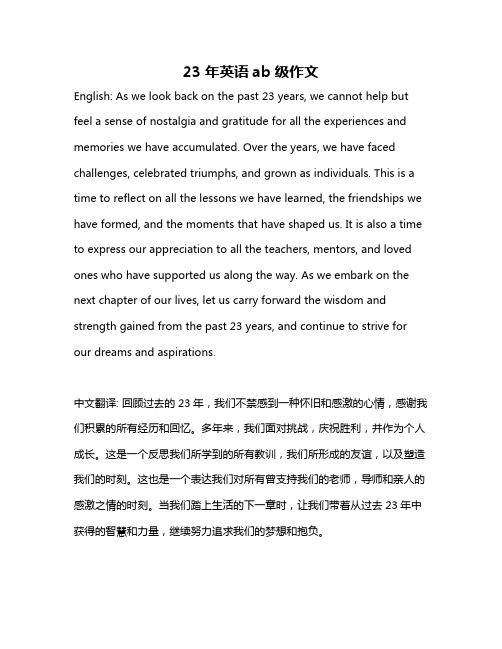
23年英语ab级作文English: As we look back on the past 23 years, we cannot help but feel a sense of nostalgia and gratitude for all the experiences and memories we have accumulated. Over the years, we have faced challenges, celebrated triumphs, and grown as individuals. This is a time to reflect on all the lessons we have learned, the friendships we have formed, and the moments that have shaped us. It is also a time to express our appreciation to all the teachers, mentors, and loved ones who have supported us along the way. As we embark on the next chapter of our lives, let us carry forward the wisdom and strength gained from the past 23 years, and continue to strive for our dreams and aspirations.中文翻译: 回顾过去的23年,我们不禁感到一种怀旧和感激的心情,感谢我们积累的所有经历和回忆。
多年来,我们面对挑战,庆祝胜利,并作为个人成长。
这是一个反思我们所学到的所有教训,我们所形成的友谊,以及塑造我们的时刻。
这也是一个表达我们对所有曾支持我们的老师,导师和亲人的感激之情的时刻。
23年大英赛b类作文范文

23年大英赛b类作文范文下载温馨提示:该文档是我店铺精心编制而成,希望大家下载以后,能够帮助大家解决实际的问题。
文档下载后可定制随意修改,请根据实际需要进行相应的调整和使用,谢谢!并且,本店铺为大家提供各种各样类型的实用资料,如教育随笔、日记赏析、句子摘抄、古诗大全、经典美文、话题作文、工作总结、词语解析、文案摘录、其他资料等等,如想了解不同资料格式和写法,敬请关注!Download tips: This document is carefully compiled by the editor. I hope that after you download them, they can help you solve practical problems. The document can be customized and modified after downloading, please adjust and use it according to actual needs, thank you!In addition, our shop provides you with various types of practical materials, such as educational essays, diary appreciation, sentence excerpts, ancient poems, classic articles, topic composition, work summary, word parsing, copy excerpts, other materials and so on, want to know different data formats and writing methods, please pay attention!表达能力。
4. 模拟考试- 定期进行模拟考试,检验自己的水平和能力。
第二十三届韩素音英汉翻译稿

走出幽谷此番美国经济复苏比以往都要缓慢,各种政府措施也是收效甚微。
“美利坚,汝欲何去何从?”美国垮掉一代的代表杰克凯鲁亚克半个世纪前发出的这一问,也是如今威胁世界经济的最大不确定因素。
美国的选民最担忧的便是。
他们即将顶着近10%居高不下的失业率,去参加十一月二号中期选举。
他们要准备好了,前路会异常艰辛漫长。
三十年代以来最严重的经济衰退在一年前终于止步。
原本起步乏力的复苏在年初又急剧放缓。
第二季度GDP缓慢爬升了1.6%,过后更是徘徊不前。
临时购房优惠政策截止后,房市也随之暴跌。
私人企业可提供的就业岗位很少,失业率看似不降反升。
整个夏季担忧与日俱增,如果复苏的脚步继续放慢,美国经济有可能再次步入衰退。
幸运的是,现在看来这些忧虑似乎有点夸大其词。
第二季度GDP 的乏力表现部分是由对中国进口额暂时激增引起的。
据最新统计,八月份还不错的零售额,失业救济申请人数也有所减少,这些都表明,尽管经济依旧疲软,但至少不会继续下滑。
经验表明,虽然经济复苏在起初一两个季度内都会出现动荡,但是很少再次陷入衰退。
目前,最有可能的情况是,美国的经济会在大概2.5%左右缓慢爬升,不至于止步不前,却也远远不足以改善失业率。
以往美国都能走出经济衰退,为何此次前景这般不堪?因为以往经济衰退多数是由紧缩的货币政策引发的。
一旦放宽货币政策,需求便随之回弹。
而这次衰退则是由金融危机引发的。
由于需要修复银行体系,重组资产负债表,金融危机后的复苏一般都显得疲缓。
通常,这种减债期会长达七年之久,也就是说美国要到2014年才能走出经济衰退。
民众可以通过一些方式更快地减少负债,但即使是乐观的市场分析人也认为行程尚未过半。
政治博弈美国最大的问题在于,政客们尚未认识到经济将长期处于缓慢发展的状态,更别提去应对其后果了。
少数敢于直言的官员们开始呼吁:失业率可能居高不下。
但是政治辩论更多的是在归咎经济衰退的责任而不是提出有建设性的方法给此次复苏注入活力。
- 1、下载文档前请自行甄别文档内容的完整性,平台不提供额外的编辑、内容补充、找答案等附加服务。
- 2、"仅部分预览"的文档,不可在线预览部分如存在完整性等问题,可反馈申请退款(可完整预览的文档不适用该条件!)。
- 3、如文档侵犯您的权益,请联系客服反馈,我们会尽快为您处理(人工客服工作时间:9:00-18:30)。
英译汉原文:Are We There Yet?America’s recovery will be much slower than that from most recessions; but the government can help a bit.“WHITHER goest thou, America?” That question, posed by Jack Kerouac on behalf of the Beat generation half a century ago, is the biggest uncertainty hanging over the world economy. And it reflects the foremost worry for American voters, who go to the polls for the congressional mid-term elections on November 2nd with the country’s unemployment rate stubbornly stuck at nearly one in ten. They should prepare themselves for a long, hard ride. The most wrenching recession since the 1930s ended a year ago. But the recovery—none too powerful to begin with—slowed sharply earlier this year. GDP grew by a feeble 1.6% at an annual pace in the second quarter, and seems to have been stuck somewhere similar since. The housing market slumped after temporary tax incentives to buy a home expired. So few private jobs were being created that unemployment looked more likely to rise than fall. Fears grew over the summer that if this deceleration continued, America’s economy would slip back into recession. Fortunately, those worries now seem exaggerated. Part of the weakness of second-quarter GDP was probably because of a temporary surge in imports from China. The latest statistics, from reasonably good retail sales in August to falling claims for unemployment benefits, point to an economy that, though still weak, is not slumping further. And history suggests that although nascent recoveries often wobble for a quarter or two, they rarely relapse into recession. For now, it is most likely that America’s economy will crawl along with growth at perhaps 2.5%: above stall speed, but far too slow to make much difference to the jobless rate. Why, given that Am erica usually rebounds from recession, are the prospects so bleak? That’s because most past recessions have been caused by tight monetary policy. When policy is loosened, demand rebounds. This recession was the result of a financial crisis. Recoveries after financial crises are normally weak and slow as banking systems are repaired and balance-sheets rebuilt. Typically, this period of debt reduction lasts around seven years, which means America would emerge from it in 2014. By some measures, households are reducing their debt burdens unusually fast, but even optimistic seers do not think the process is much more than half over.Battling on the busAmerica’s biggest problem is that its politicians have yet to acknowledge that the economy is in for such a long, slow haul, let alone prepare for the consequences. A few brave officials are beginning to sound warnings that the jobless rate is likely to “stay high”. But the political debate is more about assigning blame for the recession than about suggesting imaginative ways to give more oomph to the recovery. Republicans argue that Barack Obama’s shift towards “big government” explains the economy’s weakness, and that high unemployment is proof that fiscal stimulus was a bad idea. In fact, most of the growth in government to date has been temporary and unavoidable; the longer-run growth in government is more modest, and reflects the policies of both Mr Obama and his predecessor. And the notion that high joblessness “proves” that stimulus failed is simply wrong. Th e mechanicsof a financial bust suggest that without a fiscal boost the recession would have been much worse. Democrats have their own class-warfare version of the blame game, in which Wall Street’s excesses caused the problem and higher taxes on high-earners are part of the solution. That is why Mr. Obama’s legislative priority before the mid-terms is to ensure that the Bush tax cuts expire at the end of this year for households earning more than $250,000 but are extended for everyone else. This takes an unnecessary risk with the short-term recovery. America’s experience in 1937 and Japan’s in 1997 are powerful evidence that ill-timed tax rises can tip weak economies back into recession. Higher taxes at the top, along with the waning of fiscal stimulus and belt-tightening by the states, will make a weak growth rate weaker still. Less noticed is that Mr. Obama’s fiscal plan will also worsen the medium-term budget mess, by making tax cuts for the middle class permanent.Ways to overhaul the engineIn an ideal world America would commit itself now to the medium-term tax reforms and spending cuts needed to get a grip on the budget, while leaving room to keep fiscal policy loose for the moment. But in febrile, partisan Washington that is a pipe-dream. Today’s g oals can only be more modest: to nurture the weak economy, minimize uncertainty and prepare the ground for tomorrow’s fiscal debate. To that end, Congress ought to extend all the Bush tax cuts until 2013. Then they should all expire—prompting a serious fiscal overhaul, at a time when the economy is stronger.A broader set of policies could help to work off the hangover faster. One priority is to encourage more write-downs of mortgage debt. Almost a quarter of all Americans with mortgages owe more than their houses are worth. Until that changes the vicious cycle of rising foreclosures and falling prices will continue. There are plenty of ideas on offer, from changing the bankruptcy law so that judges can restructure mortgage debt to empowering special trustees to write down loans. They all have drawbacks, but a fetid pool of underwater mortgages will, much like Japan’s loans to zombie firms, corrode the financial system and harm the recovery. Cleaning up the housing market would help cut America’s unemployment rate, by making it easier for people to move to where jobs are. But more must be done to stop high joblessness becoming entrenched. Payroll-tax cuts and credits to reduce the cost of hiring would help. (The health-care reform, alas, does the opposite, at least for small businesses.) Politicians will also have to think harder about training schemes, because some workers lack the skills that new jobs require. Americans are used to great distances. The sooner they, and their politicians, accept that the road to recovery will be a long one, the faster they will get there.译文:我们到达目的地了吗?与大多数衰退之后的复苏相比,这次美国经济的复苏会慢得多。
